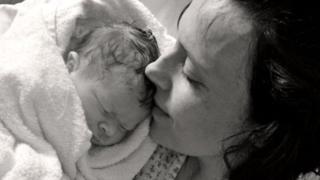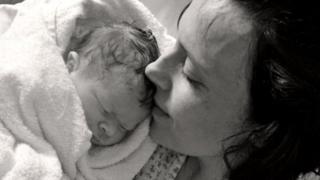Shrewsbury and Telford Hospital: Babies and mums died ‘amid toxic culture’
Staff got dead babies’ names wrong and, in one case, referred to a child as “it”, a leaked report says. …

 Image copyright Richard Stanton
Image copyright Richard Stanton Babies and mothers died amid a “toxic” culture at a hospital trust stretching back 40 years, a report has said.
The catalogue of maternity care failings at Shrewsbury and Telford Hospital NHS Trust are contained in a report leaked to The Independent.
It reveals that some children were left disabled, staff got the names of some dead babies wrong and, in one case, referred to a child as “it”.
The trust apologised and said “a lot” had been done to address concerns.
In 2017, then Health Secretary Jeremy Hunt announced an investigation into avoidable baby deaths at the trust, which runs Royal Shrewsbury Hospital and Telford’s Princess Royal.
It is being led by maternity expert Donna Ockenden, who authored the report for NHS Improvement.
Its initial scope was to examine 23 cases but this has now grown to more than 270, covering the period from 1979 to the present day.
The cases include 22 stillbirths, three deaths during pregnancy, 17 deaths of babies after birth, three deaths of mothers, 47 cases of substandard care and 51 cases of cerebral palsy or brain damage.
The interim report said the number of cases it is now being asked to review “seems to represent a longstanding culture at this trust that is toxic to improvement effort”.
The report details the pain suffered by the families:
- Babies left brain-damaged because staff failed to realise labour was going wrong, or from group B strep or meningitis that can often be treated by antibiotics
- Heartbeats not monitored adequately during labour
- One father gaining his only feedback on his daughter’s death after bumping into a hospital employee at a supermarket
- Family members being told they would have to leave if they did not “keep the noise down” when they were upset following their baby’s death
- A baby girl’s shawl, which her mother had planned to bury her in, was lost by staff
- Multiple families “where deceased babies are given the wrong names by the trust – frequently in writing” and “on occasions referred to a deceased baby as ‘it'”
It also points to an inadequate review carried out by the Royal College of Obstetricians and Gynaecologists (RCOG) in 2017 and the “misplaced” optimism of the regulator in charge in 2007.
Rhiannon Davies and Richard Stanton, whose baby Kate died in 2009, were among the families who first pushed for the independent inquiry.
Ms Davies said she was already aware of many of the issues raised by the report but said she was “shocked” by the length of time covered by the report.
“The devastating reality of Kate’s avoidable death, that I have to live with, is that she was condemned to her painful death by the culture at SaTH that wilfully refused to learn from earlier cases dating back decades,” she said.
“That is why I have fought every body and every institution in Kate’s name because no other baby will suffer the same harm while I have breath in my body.
“The only way I believe it will stop is if the police or crown prosecution service bring corporate manslaughter charges against the trust.”
Det Supt Carl Moore, of West Mercia Police, said the force was liaising with the independent inquiry and awaiting its findings before any criminal proceedings would be considered – in line with protocol in health care settings.
Sharon Morris, whose daughter suffered a brain injury 14 years ago, said she was “not shocked” by the findings.
In a statement released by Lanyon Bowdler solicitors, she said: “Every day for the last 14 years we are constantly reminded of the failure by SaTH to help me give birth to healthy twins.
“No amount of money can change things and all we can now hope for is that changes are made to ensure other families don’t suffer like we do.”
Shrewsbury and Telford Hospital NHS Trust (SaTH) said it had “not been made aware of any interim report” and awaited the findings of the full report.
Paula Clark, interim chief executive, apologised “unreservedly” to the families affected.
She added: “A lot has already been done to address the issues raised by previous cases.”
However, the report warned lessons were not being learned and staff at the trust were uncommunicative with families.
Ms Ockenden said the leaked document appeared to be an internal status update as of February 2019.
“This was produced at the request of NHS Improvement and was not meant for publication,” she said.
She said the independent review team was working to meet the family’s request for “one, single, comprehensive” report covering all cases of serious concern within maternity services at the trust.
Follow BBC West Midlands on Facebook, on Twitter, and sign up for local news updates direct to your phone.

